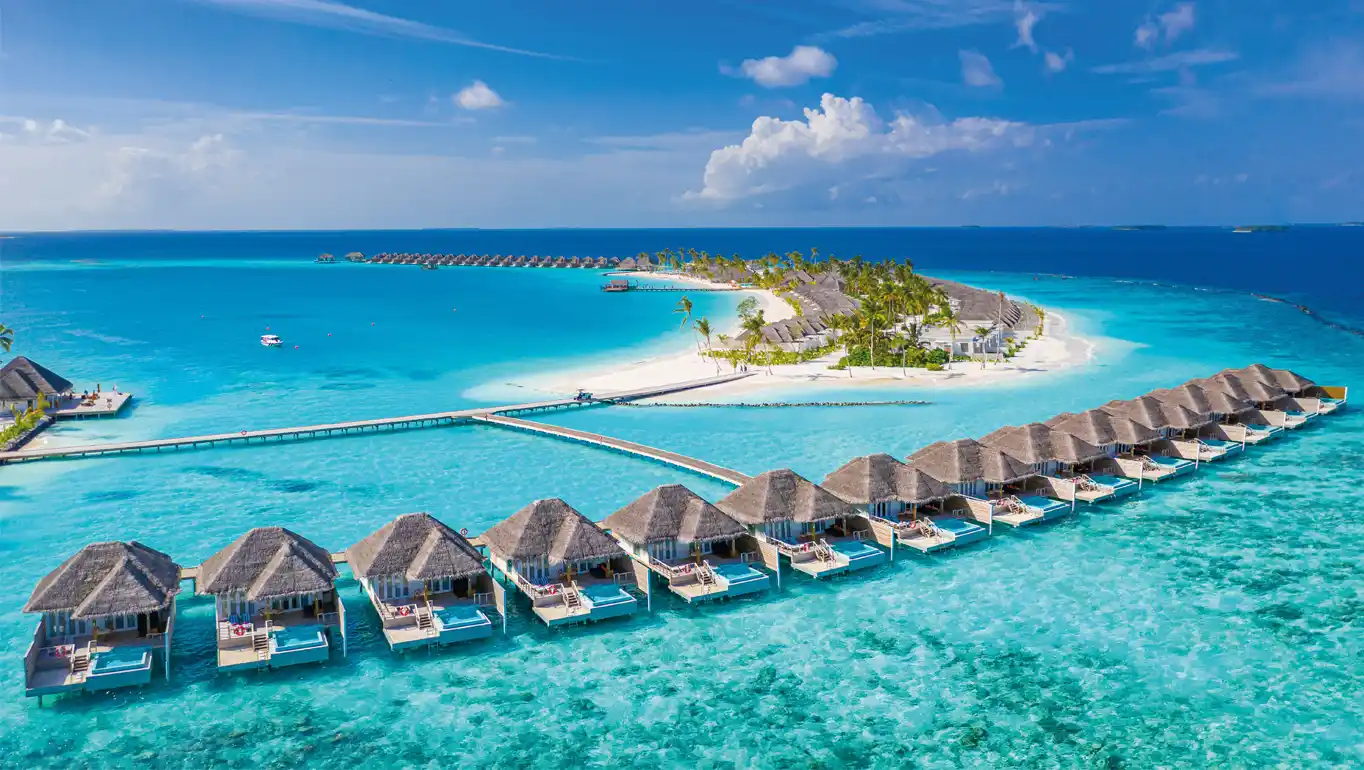The Maldives, a dream destination for its crystal-clear waters and luxurious overwater villas, is an undisputed world leader in sustainable tourism. As a traveler, you can enjoy world-class hospitality while contributing to the preservation of the country’s unique ecosystem. Many Maldivian resorts integrate sustainability into their operations, using solar energy, reducing waste, and actively engaging in marine conservation. Kudadoo Maldives Private Island, which is 100% solar-powered, along with resorts like Soneva Fushi, Six Senses Laamu, Gili Lankanfushi Maldives, and Baros Maldives, set the standard for eco-luxury by offering solar-powered villas, coral restoration programs, and sustainable travel experiences. A large number of Maldivian properties are also certified by global sustainability bodies such as EarthCheck and Green Globe, ensuring their commitment to protecting the environment.
One of the most exciting ways to experience the Maldives sustainably is by participating in marine conservation activities.
The Maldives offers hands-on experiences, such as coral planting programs, where visitors can help restore damaged reefs. Resorts like JOALI Maldives, Anantara Dhigu Maldives Resort, and The St. Regis Maldives Vommuli Resort allow visitors to ‘adopt’ coral fragments and track their growth over time. For marine life enthusiasts, a visit to Hanifaru Bay in Baa Atoll, a UNESCO Biosphere Reserve, provides an unforgettable opportunity to snorkel responsibly with manta rays and whale sharks all year round. Additionally, travelers can support conservation efforts by visiting turtle rehabilitation centers such as the Olive Ridley Project at Coco Palm Dhuni Kolhu, where injured sea turtles are rescued and rehabilitated, or visit the Sustainability Lab in Sirru Fen Fushi Private Lagoon Resort, a hub for eco-education that turns plastic waste into bespoke souvenirs and unique products.
For a more authentic experience, visitors can explore local islands. Unlike one-island resorts, local islands offer a chance to interact with Maldivian communities while staying in eco-friendly guesthouses. Islands like Ukulhas, Kihaadhoo, and Thulusdhoo provide budget-friendly accommodations, cultural experiences, and sustainable excursions such as traditional fishing, surfing, culinary tours, and guided tours of ancient sites and relics.
Food lovers can enjoy sustainable dining experiences by choosing properties that follow farm-to-table (or reef-to-plate) and sustainable food practices. Many eco-friendly resorts grow their own organic vegetables and herbs on the island, ensuring fresh, pesticide-free produce. Restaurants such as Roots, a plant-based dining concept at Patina Maldives, only serve organically farmed food from their own garden, while Badhige at SAii Lagoon Maldives strives to offer an interactive cooking and dining experience that is healthy, sustainable, and fun. For an authentic taste of Maldivian cuisine, visitors can also try local dishes such as mashuni (tuna and coconut salad eaten with Maldivian flatbread roshi) and garudhiya (traditional fish soup) at eateries on local islands.
What makes the Maldives different from the rest?
The Maldives, one of the world’s leading green destinations, is decisively committed to sustainable tourism, carefully balancing economic growth with environmental conservation. A phased ban on single-use plastics aims for complete elimination by 2030. The country is also investing heavily in solar energy to support its carbon-neutral goal. With nearly 100 protected areas—ranging from mangroves to entire islands—the Maldives actively safeguards its natural ecosystems. Initiatives like ‘Women in Tourism’ promote gender inclusivity, while sound governance decisions such as the 2010 shark fishing ban, establishing one of the world’s largest shark sanctuaries, continue to preserve the biodiversity of the island nation.
Beyond eco-friendly stays and conservation experiences, the Maldives offers a variety of nature-friendly activities that allow guests to explore the breathtaking islands without harming the environment. Sunset kayaking through natural mangrove lakes, sailing across turquoise waters, and experiences like guided snorkelling and wreck-diving provide low-impact ways to enjoy the stunning surroundings while preserving the delicate natural ecosystems.
What can you do to help on your trip?
To minimize environmental impact, the Maldives recommends travelers take simple steps such as reducing plastic waste (we request that you take back any plastics you bring with you!) and being mindful of their carbon footprint. Bringing a reusable water bottle is encouraged, as many resorts and guesthouses offer refill stations. Using reef-safe sunscreen protects the delicate coral reefs from harmful chemicals, and remember to never touch underwater creatures, feed them, or take marine souvenirs like shells or corals! Supporting locally owned businesses, dining at family-run cafés, and purchasing handmade souvenirs from Maldivian artisans are great ways to contribute to the local economy. Additionally, opting for slower travel, such as sailing between islands instead of taking multiple flights, helps reduce emissions and enhances the experience of exploring the Maldives at a leisurely pace.



